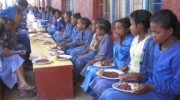Education and Equal Opportunities for 65 Women in Ethiopia
Project location: Ethiopia, Wolayta
Project start date: September 2010 -
Project end date: October 2011
Project number: 2011-26
Beneficiary: FONDAZIONE RITA LEVI MONTALCINI
TIMELINE OF THE PRESENT ACTIVITY REPORT:From 2010 to 2011
The goals of the project "Education and equal opportunities in Ethiopia" is to educate 65 young women from the territory of Wolayta at the Abba Pascal School Center for one year (secondary school for 35 girls aged from 16 to 25 in the ninth grade and for the others 30 in the tenth grade). Women in Wolayta are scarcely educated and practically totally absent from public life. This project is born against this tendency and, in time, to make some steps forward on the way of their emancipation and of gender equality. In Ethiopia, women encounter several difficulties in carrying out work activities. The average income of females is 51% of males and the rate of illiteracy 66.2% while that of males is 31%. In this context, the project intervened to promote above all a change of mentality among parents who still think inopportune to invest on the education of their daughters and among the population in general that assigns to girls duties and jobs from a tender age discriminating them in comparison of the contemporary males. Through education, this project help to liberate the inner energies hibernated for centuries, but indispensable to the progress of society.
Abba Pascal Girl's School is a school that the EEC (Ethiopian Catholic Church) has entrusted to the Ethiopian Capuchin Friars for its management. Though the institution is run by the Catholic Church it caters to all student without distinction of race, status, nationality and religion. According to the census taken on request of the education bureau, the 612 are by faith divided as follows: 55% protestants, 35% Coptic Orthodox, 8% Catholics and 2% Moslems. The school was started 39 years ago and represented since then a social revolutionary institution for the emancipation women who are mostly relegated to house chores and in a state of semi slavery to men. Abba Pascal Girl's School is becoming a pride for the local people and authority. It has begun the school year with its students in grades one to ten. The first five classes have double sessions because the teachers would encounter serious difficulties in handling large number of pupils. It is common in public schools to have as many as a hundred students per class. The teaching is carried out using the English language in all the subjects. This facilitates girls to easily fond job later on. In Ethiopia every ethnic group can teach in its own language in order to safeguard its traditions. Consequently students from the rural areas who migrate elsewhere find it difficult to communicate with others. Amharic, legally the national language, is not the main language in all the schools. In the rural area the main language is the local one, whereas well-to-do people send their children to costly schools in Addis Ababa where teaching is held in English. With also the aid of external lenders who believe in Africa, the girls, though poor, have the same chance as the others and to have access to higher education and to employment as the girls from well to do family. The girls have the key requirements in employment for office workers.
The Abba Pascal Center School has 10 years a program (2006-2015) for the emancipation of women through good standard education. To encourage participation and to foster enthusiasm many extracurricular activities are going on. School ends at 2.45 p.m. but the majority of students are busy up to 5.00 pm. Such activities are: tutorial lessons for those in need, information technology, extra in-depth lessons, sewing, English movies, English club, drama hygiene (laundry, showers, resetting classrooms, especially on Saturday) and sport. The girls have benefited also of the new library, that it was opened all afternoons. The cafeteria has been opened all the year, which offers a meal to a number of poor students sustained by sponsor.
The 65 girls selected for the project had study, with classroom lessons by teachers, also domestic science (hygiene HIV/Aids prevention, sewing), English like the main language, computer science, each in different grades (between 9th grade and 10th grade). The others school subjects are been Amharic, mathematics, history (also as the strengthening of the local culture), science, chemistry, physics, biology, information technology, sport, art, social studies, civics and music.
The students of the ninth grade were been highly motivated with very good results. They are ready for the next grade. Also the others had finished the last years and they are ready for starting to work (like secretary, or in the hospitality industry and in the local businesses, where is required the knowledge of the English language and the computer use).
The financing of the project covered the costs of the course material (book for every school subject and all the instruments for the work in the laboratory of chemistry, of biology and of computer science) and the tuitions.






